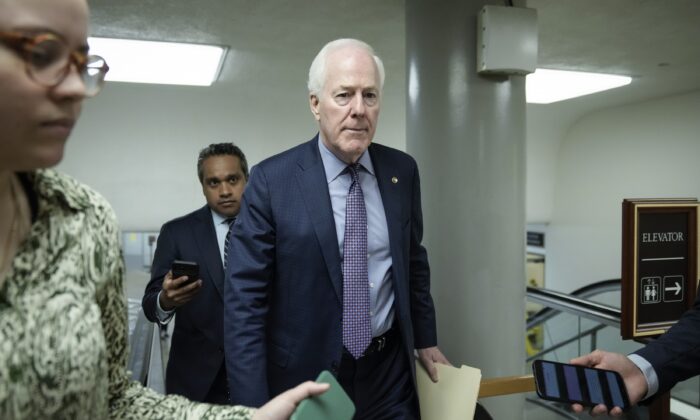By Joseph Lord
After some optimistic signs for Democrats hoping to reach a bipartisan agreement on a gun control package, progress in the negotiations has begun to stall as lawmakers failed to reach a final agreement on the legislative text on Thursday.
Following a school shooting in Uvalde, Texas that left 19 children and two adults dead, the Senate began to make a concerted push to reach a legislative agreement that could pass the 60-vote filibuster threshold in the upper chamber.
Senate Minority Leader Mitch McConnell (R-Ky.) direct Sen. John Cornyn (R-Texas) to oversee negotiations with Democrats, led by Sen. Chris Murphy (D-Conn.), for a gun control package.
Despite signs that the negotiations were going well—including the unveiling on June 12 of the broad outlines of the legislative package—progress has begun to slow.
On Wednesday, Cornyn told reporters on Capitol Hill that he’s “starting to get a little concerned” as the group tries to iron out details, including funding for states that have so-called red flag laws in place.
On Thursday, when some lawmakers hoped they could reach a final text on the package, Cornyn told reporters that negotiations had fallen through and would need more time.
He suggested that the setback is because some lawmakers are unwilling to buckle down and make a final decision.
“This is the hardest part because at some point you just have to make a decision and when people don’t want to make a decision, you can’t accomplish a result. And that’s kind of where we are right now,” Cornyn told reporters.
“You don’t want to give politicians an unlimited amount of time to talk because they will fill the available space,” he said. “It’s fish or cut bait.”
“I told them I’m leaving but I’ll be available or by text messages,” Cornyn, walking out of Murphy’s office, added.
If the bill had been worked out by Thursday, Senate Majority Leader Chuck Schumer (D-N.Y.) could have had the opportunity to bring it to the floor for a vote next week.
After lawmakers failed to reach a final agreement on the bill, Murphy downplayed the significance of the setback.
That morning Murphy, already prepared for a delay, told reporters, “I don’t think we have to get it done by today but that should be our goal.”
The broad outlines of the plan are well-known and were made public in the negotiators’ June 12 announcement.
The plan calls for an “enhanced review process” for younger gun buyers.
For prospective buyers under 21 years of age, the plan “requires an investigative period to review juvenile and mental health records, including checks with state databases and local law enforcement,” according to their statement.
The bill also will provide support for state crisis intervention, protections for domestic violence victims, funding for school-based mental health and supportive services, investment in children and family mental health services, clarification of the definition of federally licensed firearms dealer, penalties for “straw purchasing” of guns, and telehealth investments.
However, other proposals have been less well-received by Republicans.
For instance, the framework bill also includes a so-called red flag provision, allowing for “resources to states and tribes to create and administer laws that help ensure deadly weapons are kept out of the hands of individuals whom a court has determined to be a significant danger to themselves or others,” according to a June 12 statement by the group.
Red flag laws have long been controversial among Republicans and gun rights activists, who have expressed concerns that red flag laws deny individuals’ rights without due process.
Cornyn explained Republicans’ concerns during an appearance on The First TV on Wednesday.
Cornyn argued that it would be “inappropriate” to incentivize other states to pass similar laws. States that do not have such laws in place, including Texas, should be able to get financial assistance for other programs, according to the Republican. Some states with red flag laws should not get access to the funding because their laws are not in compliance with the Constitution, Cornyn indicated.
This provision, one of the most substantial concessions sought by Democrats, is in part responsible for slowing the agreement.
There are also disagreements on another provision, an effort to make sure people convicted of domestic abuse and those subject to domestic abuse restraining orders cannot have guns.
A law known as the Federal Gun Control Act bars people convicted of domestic violence from owning a gun, but it does not apply in some cases if a person commits the violence against their boyfriend or girlfriend.
“The other issue has to do with the way that nontraditional relationships are handled in terms of domestic violence and misdemeanors. We’ve got to come up with a good definition of what that actually means,” Cornyn told reporters in Washington.
Zachary Stieber contributed to this report.






